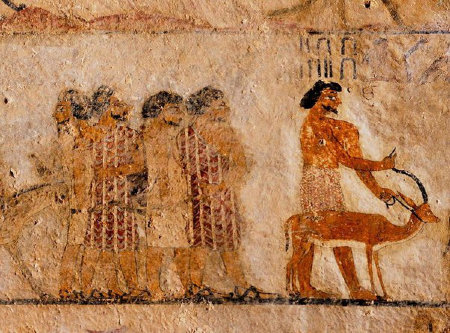Scribes
FREE Catholic Classes
(Greek grammateis, nomodidaschaloi , teachers of the law).
In the New-Testament period the scribes were the professional interpreters of the Law in the Jewish synagogues. The origin of the profession dates from the return of the Captivity, and its subsequent growth and importance resulted naturally from the formal and legalistic trend of Jewish piety during the post-Exilic period. The Law was revered as the precise expression of God's will, and by its multifarious prescriptions the daily life of every pious Jew was regulated in all its minute details. Love of the Law was the essence of piety, and the just or righteous were they who walked "in all the commandments and justifications of the Lord without blame" (Luke, I, 6). But as these commandments and justifications were exceedingly numerous, complicated, and often obscure, the needs of popular guidance called into existence a class of men whose special occupation was to study and expound the Law. The earliest mention of the title occurs in I Esdras, vii, 6, where Esdras is described as a "ready scribe in the law of Moses ". What this meant is set forth in verse 10: "For Esdras had prepared his heart to teach in Israel the commandments and judgment". This description doubtless applies to the subsequent scribes of that period. They were pious men who through love of the Divine law occupied themselves in collecting, editing, and studying the sacred literature of the Hebrews and in explaining it to the people. The earlier scribes, like Esdras himself, belonged to the class of priests and Levites ( Ezra 7:12 ; Nehemiah 8:7, 13 ; 2 Chronicles 34:13 ) who were originally the official interpreters of the Law, but unlike other priestly duties, the study and exposition of Holy Writ could be engaged in by pious laymen, and thus little by little the scribal profession became differentiated from the priesthood, while the latter remained chiefly occupied with the ever-growing sacrificial and ritualistic functions.
When under Antiochus Epiphanes Hellenism threatened to overthrow the Jewish religion, the scribes joined the party of the zealous Assideans ( 1 Maccabees 7:12, 13 ), who were ready to die for their faith (see account of the martyrdom of the scribe Eleazar, 2 Maccabees 6:18-31 ), while not a few aristocratic members of the priesthood favoured the Hellenistic tendencies. This resulted in a certain opposition between the two classes; the scribes, through their devotion to the Law, acquired great influence with the people while the priesthood lost much of its prestige. As a natural consequence, the scribes as a class became narrow, haughty and exclusive. Under the Asmonean rule they became the leaders of the new party of the Pharisees, and it is with the latter that we find them associated in the New-Testament records. They never wielded any political power, but they were admitted to the Sanhedrin on a par with the chief priests and elders and thus enjoyed official recognition. With the increasing formalism, which their influence doubtless helped to develop, the character of the scribes and their activities underwent a marked change. They neglected the deeper and more spiritual aspects of the Law, and from being men of sacred letters they became mainly jurists who devoted most of their attention to mere quibbles and subtle casuistry. Together with the Pharisees they are represented in the Gospels as being very ambitious of honour ( Matthew 23:2-7 , Mark 12:38-40 ; Luke 11:43, 45, 46 ; 20:46 ), and as making void the weightier precepts of the Law by their perverse interpretations by means of which they had gradually laid a most heavy burden upon the people. They are also rebuked by Christ because of the undue importance ascribed by them to the "traditions of the elders".
Their teaching on this point was that Moses himself had delivered to Israel an oral as well as a written Law. This oral Law, according to their theory, had come down in an authentic form through the Prophets to Esdras, the first and greatest of the scribes, and rested practically on the same Divine authority as the written Word. Through this conception of an oral law to which all their traditional customs and interpretations, however recent, were referred, the scribes were led into many departures from the spirit of the written Law ( Mark 7:13 ), and even with regard to the latter their teaching was characterized by a slavish literalism. The ever-accumulating mass of legal traditions and legal decisions was designated by the name Halaka (the way). Together with the written precepts it constituted the perfect rule of conduct which every Jew should follow. But while the scribes devoted their chief attention to the Law, both written and oral, they also elaborated in fantastic and arbitrary fashion, teachings of an edifying character from the historical and didactic contents of the Old Testament. These homiletic teachings were called Hagada, and embraced doctrinal and practical admonitions mingled with illustrative parables and legends.
Join the Movement
When you sign up below, you don't just join an email list - you're joining an entire movement for Free world class Catholic education.
-

-
Mysteries of the Rosary
-
St. Faustina Kowalska
-
Litany of the Blessed Virgin Mary
-
Saint of the Day for Wednesday, Oct 4th, 2023
-
Popular Saints
-
St. Francis of Assisi
-
Bible
-
Female / Women Saints
-
7 Morning Prayers you need to get your day started with God
-
Litany of the Blessed Virgin Mary
Biblical Lost Alphabet Traced Back to Ancient Canaanite Civilization
-

What are the Health Benefits of Grass-Fed Beef for Your Body and Mind?
-

Rise Above Poverty is Empowering Children and Families Through Education and Compassion
-
Artists and Leaders Rally to Preserve the Traditional Latin Mass
-
Republicans Demand Answers Over Army Training Slide Labeling Pro-Life Groups as Terrorist Threats
Daily Catholic
 Daily Readings for Wednesday, July 24, 2024
Daily Readings for Wednesday, July 24, 2024 St. John Boste: Saint of the Day for Wednesday, July 24, 2024
St. John Boste: Saint of the Day for Wednesday, July 24, 2024 Prayer for Travelers: Prayer of the Day for Wednesday, July 24, 2024
Prayer for Travelers: Prayer of the Day for Wednesday, July 24, 2024- Daily Readings for Tuesday, July 23, 2024
- St. Bridget of Sweden: Saint of the Day for Tuesday, July 23, 2024
- A Child's Prayer to Mary: Prayer of the Day for Tuesday, July 23, 2024
![]()
Copyright 2024 Catholic Online. All materials contained on this site, whether written, audible or visual are the exclusive property of Catholic Online and are protected under U.S. and International copyright laws, © Copyright 2024 Catholic Online. Any unauthorized use, without prior written consent of Catholic Online is strictly forbidden and prohibited.
Catholic Online is a Project of Your Catholic Voice Foundation, a Not-for-Profit Corporation. Your Catholic Voice Foundation has been granted a recognition of tax exemption under Section 501(c)(3) of the Internal Revenue Code. Federal Tax Identification Number: 81-0596847. Your gift is tax-deductible as allowed by law.










 Daily Readings for Wednesday, July 24, 2024
Daily Readings for Wednesday, July 24, 2024 St. John Boste: Saint of the Day for Wednesday, July 24, 2024
St. John Boste: Saint of the Day for Wednesday, July 24, 2024 Prayer for Travelers: Prayer of the Day for Wednesday, July 24, 2024
Prayer for Travelers: Prayer of the Day for Wednesday, July 24, 2024

